Meet Douglas Rushkoff: a heavyweight in the field of media ecology relishes the lightness of being on the mat
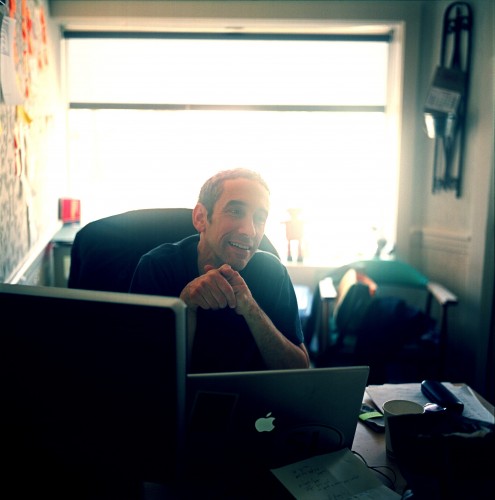
by Louise Fecher
Present Shock . . . a media theorist navigates the sea of modern distractions
In his latest book, media theorist Douglas Rushkoff explores our relationship to time in the digital age and how our perceptions of time paint our personal, cultural, economic, and political landscapes. “We tend to exist in a distracted present, where forces on the periphery are magnified and those immediately before us are ignored,” Douglas writes in the preface to Present Shock. He continues, “Our ability to create a plan–much less follow through on it–is undermined by our need to be able to improvise our way through any number of external impacts that stand to derail us at any moment.” In the chapters that follow, the author deftly sifts through the complexities of what got us here with clarity, passion, and humor. There are five stops on Douglas’s carefully drawn road map to understanding present shock. First stop– narrative collapse–is the inability to create and comprehend stories that begin and end: think reality TV programs devoid of scripts (and intelligence); perpetually raging news program hosts vs diligent reporting and analysis. Then there’s “fractalnoia,” a term coined by the author to describe the desperate desire to make sense of a narrative-challenged world by connecting dots that are not actually related. Conspiracy theories, the author notes, are one result of favoring disjointed patterns over straight paths. Douglas doesn’t waste readers’ time by decrying the digital world; rather, word-rich and wise, Present Shock offers understanding and awareness. From this place, we can escape trapped-in-the-moment presentism and shape a more hopeful and healthy life, giving each moment, as Douglas writes, “the value it deserves, and nothing more.” –Louise Fecher |
Douglas Rushkoff spends a lot of time sitting down on the job. “I’m either sitting and thinking, or sitting and writing,” he says. Fortunately, Douglas has a pretty cool job. An intrepid observer and interpreter of media and how communication methods shape our actions, politics, and culture, this New York City native and Westchester resident has written twelve books, created documentaries for PBS, and penned articles for The New York Times and Time magazine. A dynamic speaker, he has lectured at universities and conferences around the world, teaches at The New School in Manhattan, and has been a guest on many radio and television programs.
The robust response to his Douglas’s newest title, Present Shock: When Everything Happens Now (Current, 2013) (see the sidebar at right), has sent the author spinning like a human tornado: one day he’s filming The Colbert Report in New York City, the next he’s doing a signing at a Canadian book store, a few days later he’s lecturing in Washington, DC.
Exciting? You bet. But laboring over a laptop can wreak havoc on the body, as can sitting on cramped airplanes or driving here, there, and everywhere to promote your work. To help stay healthy in body and mind, Douglas has found a refuge: a dedicated yoga practice that is teaching his body to fly as freely as his thoughts.
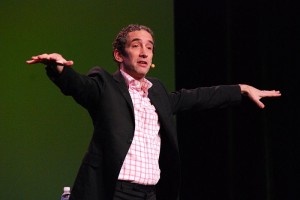
Douglas Rushkoff taking flight on stage.
“I [thought] yoga might be a good way to get back into the body and create some time and space for me as a human,” he says. “That it would support me taking care of my wife and daughter, support me not sleeping. I’m working, like anybody, working three jobs to pay the mortgage and the taxes. And the jobs I do are very public. It’s great on a certain level, but when you’re doing NPR, and then a TV thing, and then a press thing, a lot of stress hormones get released in your blood.”
Douglas began working with Karen Safire, a former dancer and a popular Westchester yoga teacher, when he heard about a program that she was starting near his Hastings-on-Hudson office. He’d taken a smattering of yoga classes during college in New Jersey–he graduated from Princeton in 1983–and after, while living in lower New York. (“I would sometimes go to those sexy classes in the East Village,” he says with a laugh.) Later, living on the West Coast (where he earned a Master of Fine Arts from the California Institute of Arts in Los Angeles), he developed a daily tai chi practice. But Douglas was a novice when he walked into Karen’s yoga class two years ago. He wasn’t familiar with the poses and, like many newbies, would struggle to lunge his foot forward from Downward Dog. “You should have seen what I used to have to do to get it up there,” he says, playfully mimicking leg dragging movements.
Douglas is astounded by how far his physical practice has come–“it’s crazy!” he says. He’s even more surprised by his new-found passion for inversions–a class of poses he used to avoid with equal passion.Diminutive and determined, the author continued taking class, going twice a week whenever he was able. Now, sprightly at age 52, Douglas is at home with classmates who are longtime yoga practitioners. He can lunge like a lion, soar like a bird (just last month he found himself poised perfectly in Crow, a challenging hand balance), and in time, will likely be able to leap tall buildings in a single bound.
“Now I’m all about the inversions, which I’d never thought I’d do,” the author says. “There’s this moment. You kick your legs up like three times. But then there’s the one when you feel it’s going to happen. It’s like, whoa! I like that feeling; I like it because I was so afraid of it for so long.”
A dedicated yogi knows that the poses are just part of the practice. And for Douglas, yoga offers a sense of community and safety that he often finds lacking in his very public professional life. For this reason, he declined to be photographed in yoga postures for this article, preferring to keep his personal life off the Internet. “Any photo could end up being re-contextualized and tweeted by ‘haters’ in an effort to discredit my work. Sad, but there it is,” he admits.
If you see Douglas as I do, as a sweet, funny, and supportive yoga classmate (Karen Safire, shown below demonstrating Crow pose, is my teacher as well), it’s hard to imagine hatred being aimed in his direction. But when I asked Douglas about it, he reminded me that his theories and ideas are the target–not him–and he’s learned to accept that.
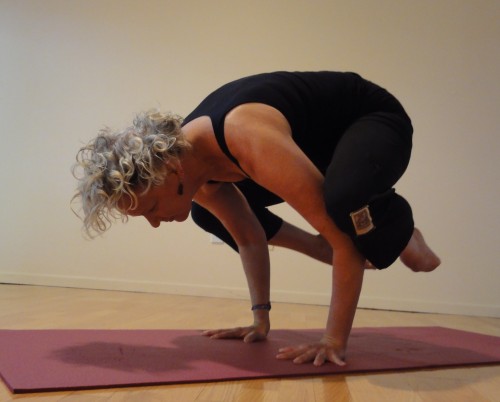
- Karen Safire taking flight in Crow pose.
“The world’s gotten meaner,” Douglas says. “Because the economy’s doing poorly, because the public discourse has degraded into this very polarized clash, because there’s a lot of politicians and a lot of people in media now who are actively fomenting discontent–people who think Obama and Osama are the same person. There are angry people out there. And when you’re . . . up on the stage, on the radio, putting yourself out in front of hundreds of thousands of people a day, you’re bound to run into some mean ones. So let them attack what you are saying, your belief system.”
But Douglas won’t accept, or do anything to inadvertently encourage, critics bringing his family, his home, his yoga practice –“the most sacred, personal parts of my life”–into the public debate. “Not everything in one’s life can be grist for the mill, or there’s no life left!” he asserts.
For Douglas, yoga provides not only a refuge from daily demands, he’s also found his practice to be a delicious contrast to his professional life. As an author, commentator, and consultant, he must bear the mantle of authority, be an expert. In yoga, he is able to experience the opposite. Although he’s becoming proficient at physically demanding asana, Douglas believes he’s moving into what he calls “an eternal beginner phase.”
“You make this thing called progress–moving further forward. But when I move forward, I zoom out more, and see that the thing is actually further away,” he muses. “Every time I go into yoga, I walk into this room and be blank. It’s so nice. Today, wherever we are, it’s like discovery every single time. I’m just loving that eternal beginner thing.”
You can read more about Douglas and his work at his website, www.rushkoff.com.



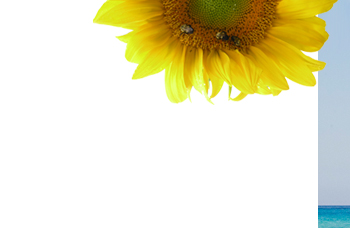
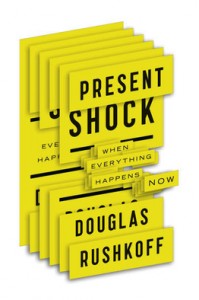 Your front doorbell is chiming, the answering machine in the living room is recording a message, the drier downstairs is beeping. On your computer, an impatient queue of emails demand attention, including a prod from Facebook reminding you that “a lot has happened” since you last checked in. Tucked in your handbag, your cell phone chirps. You don’t know which call to answer first, which crisis to avert, who (or what) to pay attention to and in what order. Your think your life is all about deadlines and demands, and you want to scream. Do you need a vacation? Probably. Are you suffering from “present shock”? Definitely.
Your front doorbell is chiming, the answering machine in the living room is recording a message, the drier downstairs is beeping. On your computer, an impatient queue of emails demand attention, including a prod from Facebook reminding you that “a lot has happened” since you last checked in. Tucked in your handbag, your cell phone chirps. You don’t know which call to answer first, which crisis to avert, who (or what) to pay attention to and in what order. Your think your life is all about deadlines and demands, and you want to scream. Do you need a vacation? Probably. Are you suffering from “present shock”? Definitely.